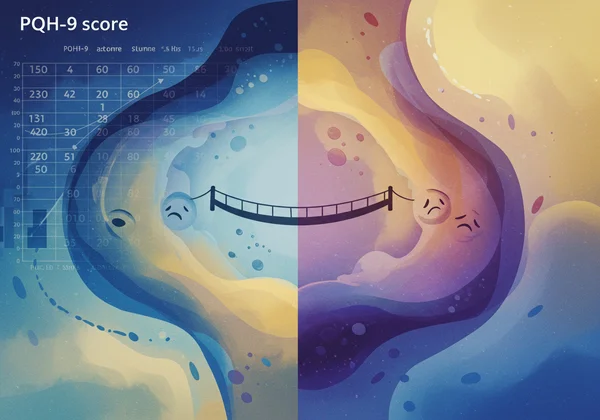Understanding Depression: Beyond Your PHQ9 Score
October 30, 2025 | By Clara Holloway
Your PHQ-9 score is a crucial first step, but what does it really mean for your daily life? You've seen a number, but depression is an experience, not a statistic. This article bridges that gap, helping you connect the numbers on the screen to real-world experiences. It’s about understanding depression’s subtle and overt signs. So, what does the phq9 score mean when translated into feelings, thoughts, and actions?
Understanding your emotional health is a journey, and the PHQ-9 is designed to be a gentle, confidential starting point. It helps name feelings that can be confusing and isolating. If you're ready to see where you stand, you can take the assessment on our homepage.

Emotional & Cognitive Signs of Depression in Everyday Life
Depression often begins as an internal shift, affecting how you feel and think long before it's visible. These changes can be gradual, making it hard to pinpoint what’s wrong. Recognizing these signs is the first step toward clarity.
The Persistent Cloud: What Depression Feels Like Emotionally
It's more than just sadness. Depression often feels like a persistent emotional cloud or a heavy blanket of numbness. You might feel empty, hopeless, or cry without knowing why. This feeling lingers day after day, coloring your perception of the world and making it difficult to feel positive about anything. This pervasive mood is a core indicator reflected in a PHQ-9 screening.
Difficulty Concentrating & The Foggy Mind
Ever felt like your brain is filled with fog? This hallmark cognitive symptom of depression makes focusing on tasks, making decisions, or remembering appointments incredibly difficult. This isn't laziness; it's a neurological effect of depression making even small tasks monumental.

Loss of Interest: When Nothing Sparks Joy Anymore
Anhedonia, the loss of interest in activities you once enjoyed, is a telling sign. Hobbies, social gatherings, or favorite foods may suddenly feel bland and unappealing. This isn't a choice but a profound shift in your brain's reward system that leaves you feeling disconnected.
Irritability and Short Temper: A Less Obvious Sign
While sadness is common with depression, increased irritability is an often-overlooked symptom, especially in men. You might have a shorter fuse, snap at loved ones, or feel constantly on edge. This frustration often stems from the internal exhaustion of managing difficult symptoms.
Physical & Behavioral Depression Symptoms You Might Overlook
Depression isn't just in your head; it lives in your body. The mind-body connection is powerful, and emotional distress often manifests as physical ailments and changes in your daily routines. These symptoms are directly assessed in the questions of the PHQ-9.
Changes in Sleep: Too Much or Not Enough Rest
Depression often disrupts sleep. For some, it means insomnia—lying awake with racing thoughts or waking up in the middle of the night. For others, it’s hypersomnia—sleeping 10 or more hours and still feeling exhausted. Neither provides the restorative rest your body needs. An emotional health checkup can help see if sleep patterns are part of a larger picture.
Appetite & Weight Fluctuations: More Than Just Dieting
Depression can wreak havoc on your appetite, leading to unintentional weight loss or gain. Some people lose interest in food, while others turn to it for comfort. These shifts are driven by changes in brain chemicals that regulate mood and appetite. A significant, unplanned change is an important signal.
Persistent Fatigue and Lack of Energy
This isn't ordinary tiredness. The fatigue from depression is a profound, bone-deep exhaustion that makes every action a struggle. Getting out of bed or making a meal can feel monumental. This lack of energy feeds into loss of interest, creating a difficult cycle.

Aches, Pains, and Unexplained Physical Issues
Emotional pain often manifests physically. Chronic backaches, persistent headaches, or stomach problems with no clear physical cause can be symptoms of depression. Your body may be signaling that something is wrong emotionally. If you've been chasing physical symptoms without answers, consider your mental health.
Social & Functional Impacts of Depression on Daily Life
Depression’s effects ripple outward, touching your relationships, work, and daily function. It can build walls between you and loved ones and make responsibilities feel impossible to manage.
Social Withdrawal: Pulling Away from Loved Ones
When you're struggling internally, social interaction can feel draining. You might start canceling plans, avoiding calls, and isolating yourself from friends and family. This isn’t because you don’t care; it's often a self-preservation mechanism. However, isolation can worsen feelings of loneliness and depression. Taking a free screening online can be a private first step to understanding this.

Reduced Productivity at Work or School
The combination of fatigue, poor concentration, and low motivation makes it incredibly difficult to perform at your usual level. Deadlines may get missed and the quality of your work may decline. This isn't a reflection of your ability but a direct consequence of depression's impact on executive function, which can lead to feelings of guilt.
Your Next Steps: Connecting Your Score to Your Story
Recognizing yourself in these descriptions can be both daunting and relieving. These signs are not personal failings; they are well-documented symptoms of a common health condition. Your experiences are valid. The PHQ-9 is a powerful tool because it connects your story—your feelings and struggles—to a clear, understandable framework. Your score is not a label; it is a starting point for a conversation with yourself, a loved one, or a healthcare professional.
If you’re ready to take that first step, we invite you to start your PHQ9 assessment today. It's free, confidential, and takes only a few minutes. Let it be the tool that helps you connect the dots and begin your path toward clarity and well-being.
Frequently Asked Questions About Depression & The PHQ9
What is the PHQ9, and how does it help understand depression?
The Patient Health Questionnaire-9 (PHQ-9) is a 9-question screening tool used to assess the presence and severity of depression symptoms. It asks about your experiences over the past two weeks, covering key emotional, cognitive, and physical signs. The score helps quantify your experience, making it easier to track changes and communicate your feelings to a doctor.
What does a PHQ9 score mean in terms of daily life?
A PHQ-9 score translates symptoms like loss of interest, sleep problems, and fatigue into a numerical value. A higher score generally corresponds to more severe and frequent symptoms, indicating a greater impact on your daily life. It helps contextualize your feelings by showing they fit a recognizable pattern, providing a snapshot of your current emotional state.
Can the PHQ9 be used to diagnose depression?
No, and this is a critical point. The PHQ-9 is a highly reliable screening tool, not a diagnostic tool. It identifies individuals who may be experiencing depression and should seek further evaluation. A formal diagnosis can only be made by a qualified healthcare professional after a comprehensive assessment. Think of the PHQ-9 as a thermometer for your mood: it tells you if there’s a fever, but a doctor must find the cause. You can discover your score as a first step.
Is the PHQ9 reliable for self-assessment?
Yes, the PHQ-9 is one of the most clinically validated tools for self-assessment of depressive symptoms. It was designed to be straightforward for individuals to complete honestly on their own. Its reliability makes it a valuable resource for personal reflection and for preparing to have a more informed conversation with a healthcare provider.